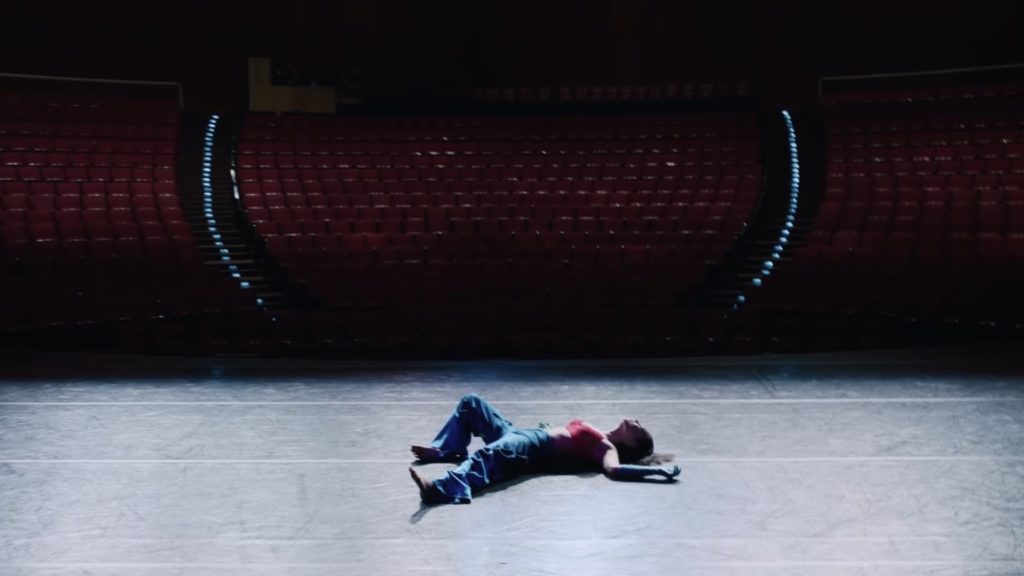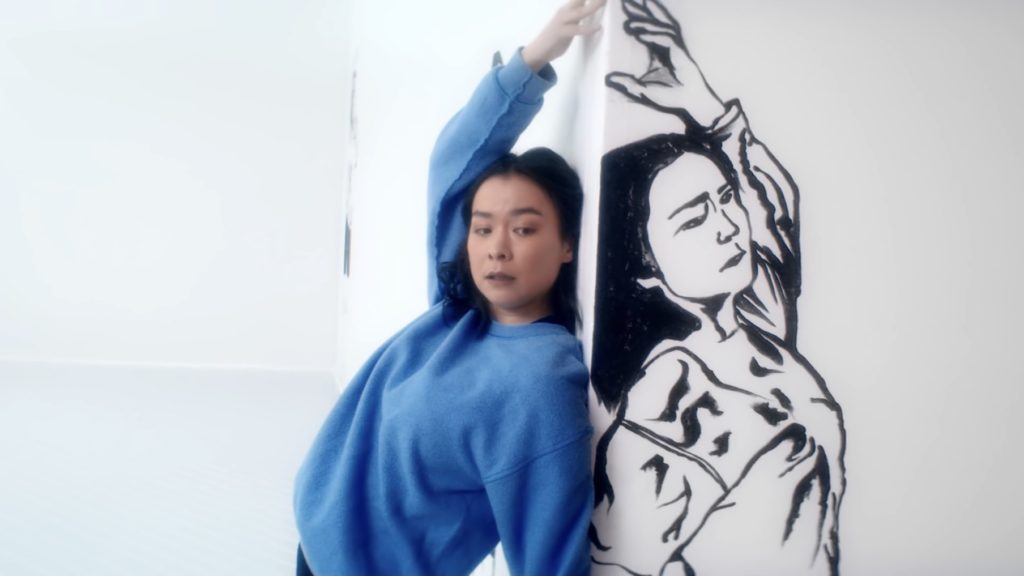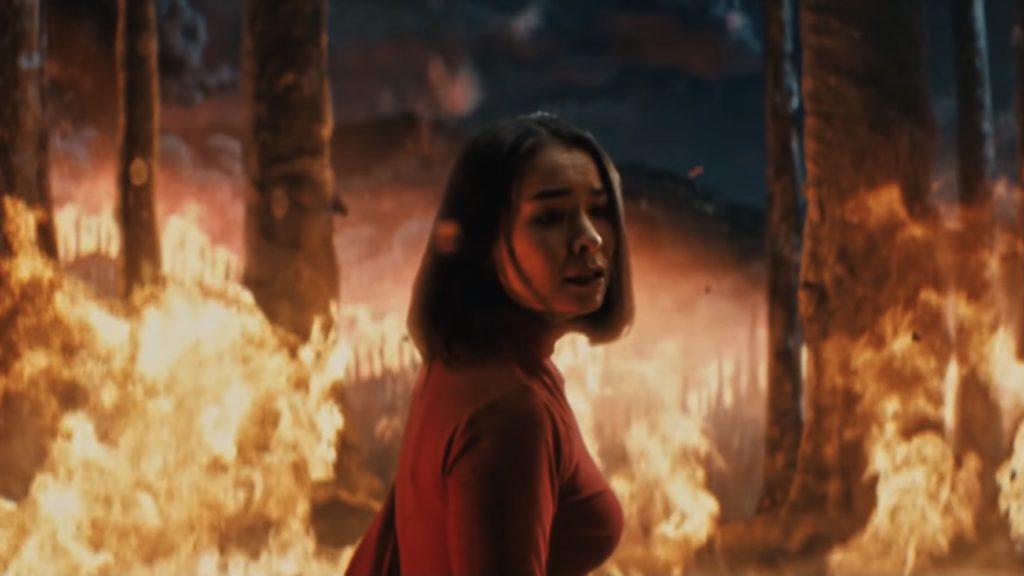by Ryan Wong
On the last stop of her Be the Cowboy tour in September 2019, Japanese-American musician Mitski announced the NYC performance would be her last “indefinitely”. Despite later clarifications that she would not be quitting music for good, it was revealed that she had, in fact, planned for the Central Park show to be her last. “I was thinking this was the last show I would perform ever, and then I would quit and find another life,” she told Rolling Stone. “I performed, and I remembered how much I loved it. And I remember walking offstage, and I immediately started crying. Like, ‘What have I done?’”
The singer-songwriter disappeared from the public eye, deleting her social media after a final tweet of “It’s time to be a human again.” But due to a contractual obligation with her record label, and a bout of regret despite her newfound peace, Mitski decided in early 2020 that she would make a return to the spotlight. “Working for the Knife”, the lead single off her latest album Laurel Hell, was released after a two-year hiatus last October.

Written near the end of 2019, not a month after her earlier decision to quit, the song’s lyrics and music video—ending with Mitski collapsed onstage after a full minute of chaotic movements, turning to give the camera a delirious smile—makes clear that the singer rejects her self-exploiting way of life, but can do little to change it. “What it came down to was: ‘I have to do this even though it hurts me, because I love it,’ ” she said. “ ‘This is who I am. … I’m going to keep getting hurt, and I’m still going to do it, because this is the only thing I can do.’ ”
And so Laurel Hell was born. Named after a folk term used to describe dense thickets of laurel bushes found in the southern Appalachian Mountains, Mitski said: “[…] there are a lot of Laurel Hells in America, in the South, where they’re named after the people who died within them because they were stuck. And, so the thing is, laurel flowers are so pretty. They just burst into these explosions of just beauty […] I liked the notion of being stuck inside this explosion of flowers and perhaps even dying within one of them.”
Aptly put, most if not all the tracks on the album are pervaded by a sense of ensnarement within something beautiful. This itself is not new for the singer: previous releases such as 2014’s Bury Me at Makeout Creek include a handful of tracks for which there are undercurrents of that same feeling. But while that album expresses it alongside slamming guitar riffs, Laurel Hell does it in an entirely differently way. A primarily synth-pop record, the contrast between Mitski’s biting lyric prose and a sound straight from the 80s club scene makes for a story that goes something like this: Yes, I don’t think we’ll ever be free, but let us continue dancing anyway.

While Mitski presents her melancholy through stony eyes on “Working for the Knife”, she is anything but resigned on “Love Me More”, the album’s final pre-release single. She begins quiet, as if talking to herself: “If I keep myself at home / I won’t make the same mistake / That I made for fifteen years / I could be a new girl.” The instrumental builds up, and so does she. As the song reaches its crescendo, she is loud, near desperate to be heard against the tidal synths of the chorus. “I need you to love me more / Love me more, love me more,” she pleads. “Love enough to fill me up / Fill me up, fill me full up.”
I am a firm believer that the reason some stories stick with us more deeply than others is not because of the stories themselves, but of the circumstances in which we discover them. It just so happened that “Love Me More”—its music video featuring a scene where Mitski runs around a canvas room, frantically trying to copy portraits of herself on the walls before smashing her head through the final one—was released at a time where I was, in a way, standing outside that very same room.
Just the day before, my final semester at college had begun. In half a year’s time, I would be done with A-Levels, and after that would come university. A job. Money. Taxes. Bills. All the big shoes I was, and still am, terrified to fit my feet into. As I watched the “Love Me More” music video for the first time, I felt, more than anything, that same terror, taking my hand and whispering: “You want that too, don’t you?”
I didn’t. I did. I couldn’t. I would have nothing less.
A creative individual, whose eighteenth birthday would be in a week. Who, amid thoughts of adulthood and life-altering decisions and what they’d mean for the creative inside them, finds a glass shard on the floor that shows them a future version of themselves—a version they both love and mourn for. And while the comparison may be a little arrogant of me to make, what with Mitski being an acclaimed artist adored by millions, I think that same arrogance is the reason I am even here, writing this to begin with.
Fast forward to Laurel Hell’s release on February 4, and the sentiment of “Love Me More” is echoed on “Everyone”. On an instrumental that steps and floats where the former’s leaps and soars, Mitski laments her decision to become an artist. “Everyone said, “Don’t go that way” / So, of course, to that, I said / “I think I’ll go that way”,” she sings, her voice colored by anguish. “And I opened my arms wide to the dark / I said, “Take it all, whatever you want” / I didn’t know that I was young / I didn’t know what it would take.”
And so we see the price of Mitski’s dreams. There was that fear again—of me, going down that same path; giving myself up to the fire within only to burn out just as fast, having missed my chance to lead a ‘normal’ life. For something as vague as a dream to ‘create’, choosing to follow it feels much like turning around to face the people you’ve walked the beaten path with for your entire life, pointing to the tiny slit in the thicket up ahead and saying, just as Mitski did, “I think I’ll go that way instead.” In the world of art, as harsh as it is magnificent, there are only forest fires and charred trees that wish they’d stayed on the familiar road.

In “Love Me More”, Mitski is haunted by the ghosts of her success, craving a love strong enough to drown out her feelings of isolation, inadequacy, and regret. Whether to a significant other, an audience, or even music itself, she asks, “Please take this sole thing that I’m able to do and please love it.”
I ask myself in turn: Is writing all I can do? Do I love writing? Do I love it enough to make it my entire life? Will I be okay even if no one’s around to love my writing for me? Will I still be happy, creating as a means to survive, rather than as a declaration of survival, of being alive?
I don’t quite have the answers yet. The last two questions, in particular, keep me up at night. It’s one thing to tell myself I love writing; to convince myself that I am, in fact, good enough to do just that. It’s another when the opinions of others are brought into the mix. To be an artist by profession is to submit to the observations of those around you: there is no such thing as an established, successful artist who has gotten to where they are by listening only to their heart, as much as the films we watch might have us believe otherwise. So what if you love the art you make? If nobody else does, can you still go on? Will you still be happy then?
In the same Rolling Stone interview mentioned earlier, Mitski described finding herself in a paradox because of this. For the sake of her career, and of what the industry demanded of her, she suppressed her feelings to the point where she began to lose her ability to feel anything. “[…] After a few years of doing that every single day, my heart really did start to go numb and go silent. And the problem with that is that I actually need my heart—my feelings—in order to write music.”
This is the reason songs like “Working for the Knife”, “Love Me More” and “Everyone” exist. Why artists, who offer their emotions, thoughts, and very sense of self in an uncertain exchange for financial security, lose themselves so easily. In the words of Mitski, “Everything in the world has a cost: If I truly want the greatest magic in the world, the highest euphoria, the best thing, if I want to do that, I’m going to have to pay an equivalent price.” And with Laurel Hell, the singer, now more successful than she’s ever been, tells us quite simply just what that price is. From “Working for the Knife”: “I always thought the choice was mine / And I was right, but I just chose wrong.”
So here I am, still on the same path I’ve walked on for eighteen years now. The opening is up ahead, getting closer and closer. I know there must be others like it further down, but I can’t shake the feeling that if I let this one go, I might never have it in me to turn around again. If the world was a bit kinder, a bit more forgiving of those who choose to pursue their dreams, I think I’d already be somewhere deep within the forest, letting my heart lead the way instead of keeping it close; sheltering it with hands that have only ever felt the heat and seen the smoke from far away. However which way I end up getting through this forest, I know that I will always be creating, writing, and telling art in some capacity or another. I have that certainty, at least. On a path that feels more like the jut of a cliff right now, I can only hope that if I do make the jump, that I do so with the sure grace of someone who has tasted the flames waiting by the jagged rocks below, and knows they can handle it.
The first lines of Laurel Hell: “Let’s step carefully into the dark / Once we’re in, I’ll remember my way around,” and its last—“That’s where you loved me,” repeated over and over as Mitski’s voice fades into silence—both describe old places in intimate detail; unvisited, covered in dust, yet impossible to ever forget. One can only wonder if that darkness, that familiar, dreamlike land of love, are one and the same.